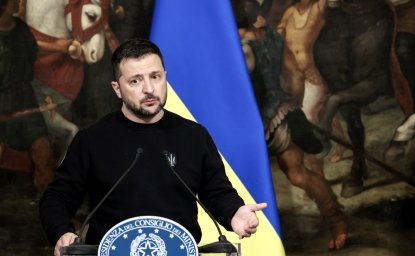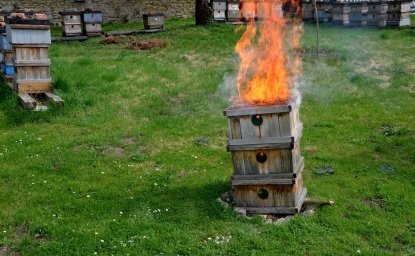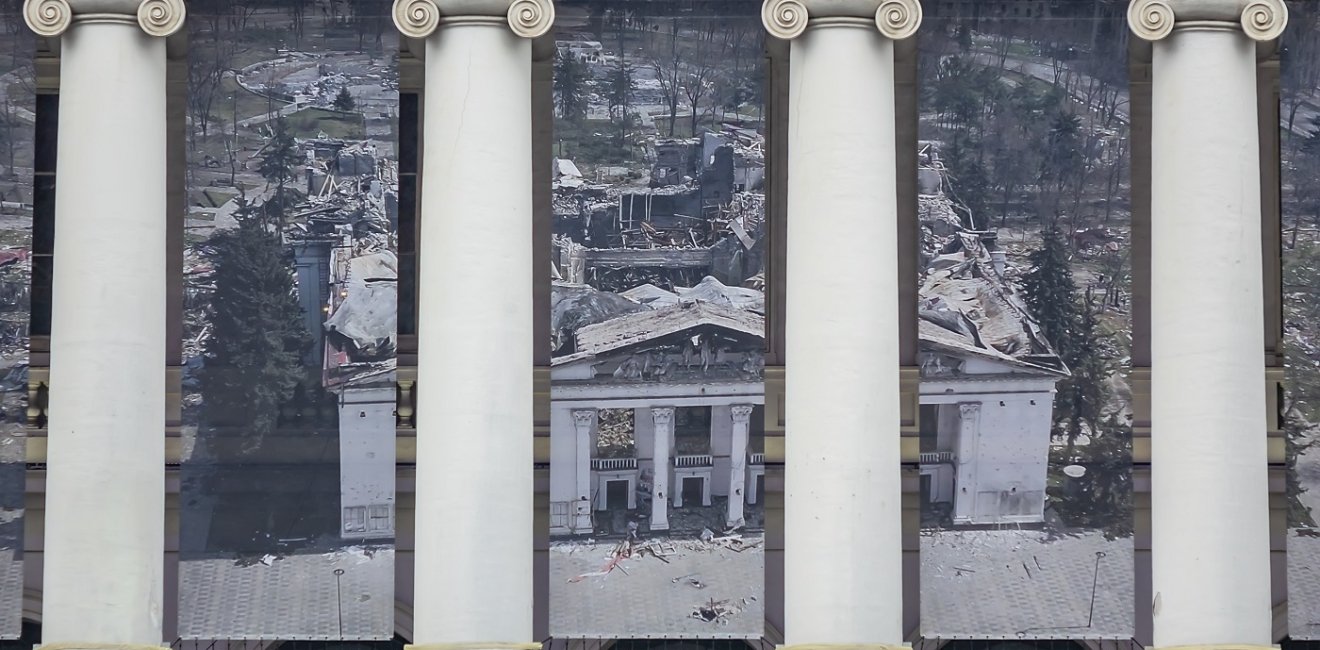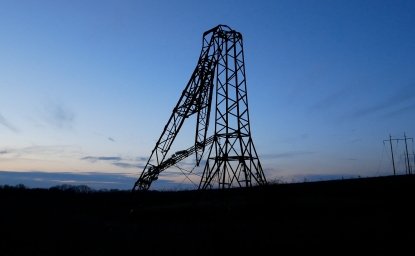
A blog of the Kennan Institute
Few Britons or Americans had ever heard of Mariupol before 2022. The southern Ukrainian steel town and port of around 120,000 residents did not attract many tourists. But now, more than two and a half years after the Russian full-scale invasion, the occupied rust-belt city has become a symbol of Russian brutality, thanks to news coverage of the three-month Russian siege in 2022, and Stystav Chernov’s documentary about it, 20 Days in Mariupol. The film won the 2024 Oscar for best documentary feature. A few months later, Inna Goncharova’s powerful play about the city, The Trumpeter, won critical acclaim at its premiere at London’s Finborough Theatre in July.
Goncharova’s script tells the true story of the lone survivor of one of Ukraine’s marine brigade bands at Mariupol, a trumpeter trapped for 80 days with other Ukrainian fighters in the underground labyrinth under the massive Azovstal steel plant. Held up with companions by an unrelenting Russian artillery barrage, the trumpeter desperately tries to find harmony in his music as he plans to compose a “symphony of war.”
The small theater is blacked out, with just four chairs on stage. The trumpeter is joined by three other characters sheltering in the same bunker. The audience learns about the trumpeter’s life as a musician against the constant backdrop of shaking walls and falling ceilings. Russian bombs interrupt his efforts to understand why he has failed as a composer. His constant self-reflection and horn tooting increasingly irritate his bunker mates, whose nerves are frayed from living through constant attack. The play becomes a 60-minute search for harmony amid cacophony.
Playwright Goncharova is a writer, actor, director, and public figure in the Kyiv theater community. She teamed up with admired actor Peter Mironov in 2022 to bring this play to Kyiv audiences.
English writer John Farndon included the work among several wartime Ukrainian plays he translated for the London stage. The Guardian’s David Jays found The Trumpet to provide a feverish foray into the mind of warriors through a work that pays passionate homage to Ukraine’s lost musicians.
Veteran London actor Kristin Milwad dominates the production as the trumpeter, as did Mironov in Kyiv. Jays reports that Milwad “rattles with vitality, stretching an incongruous smile despite the circumstances.” He writes, “We don’t hear the composer’s music but Milwad performs a vocal symphony: smoke-voiced anxiety, bellows of bombardment, a voice worn to wisp by fear—and the rasp of breath in the darkness that means survival.”
A renowned showcase for new theater, the diminutive Finborough has worked closely with Farndon and the Worldwide Ukrainian Play Readings project to bring Ukrainian works to London. Their collaborations include a highly praised production of Neda Nejdana’s Pussycat in Memory of Darkness, also featuring Milwad (see June 9, 2023, blog post).
As audiences of this summer’s Finborough plays and last winter’s documentary film discovered, Mariupol’s anguish encapsulates the tragedy of the current war in Ukraine. A Ukrainian Everytown, the city’s ordinariness speaks to the torment Ukrainians face about their past failures and future potential, as well as to the hopes and fears of anyone anywhere during wartime.
The opinions expressed in this article are those solely of the author and do not reflect the views of the Kennan Institute.
Author

Former Wilson Center Vice President for Programs (2014-2017); Director of the Comparative Urban Studies Program/Urban Sustainability Laboratory (1992-2017); Director of the Kennan Institute for Advanced Russian Studies (1989-2012) and Director of the Program on Global Sustainability and Resilience (2012-2014)

Kennan Institute
The Kennan Institute is the premier US center for advanced research on Eurasia and the oldest and largest regional program at the Woodrow Wilson International Center for Scholars. The Kennan Institute is committed to improving American understanding of Russia, Ukraine, Central Asia, the South Caucasus, and the surrounding region though research and exchange. Read more

Explore More in Focus Ukraine
Browse Focus Ukraine
Building a Thriving Ukrainian Design Community Now

Ukraine Seeks to End the War. What's Wrong With the “Peace Scenarios”?


